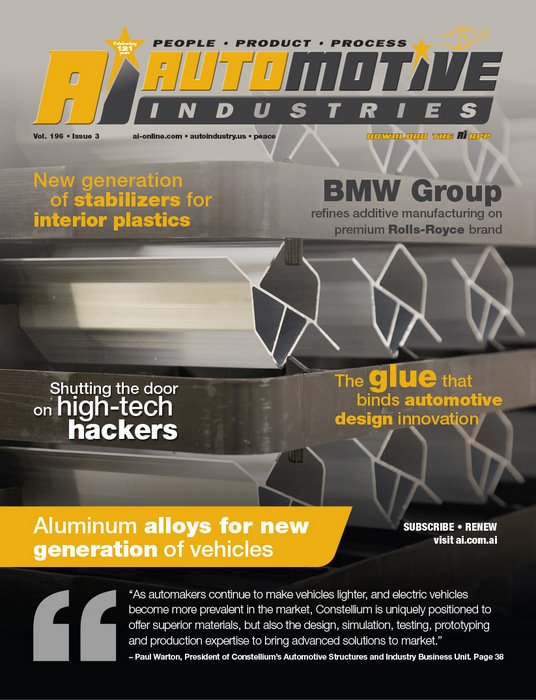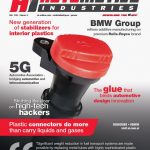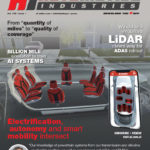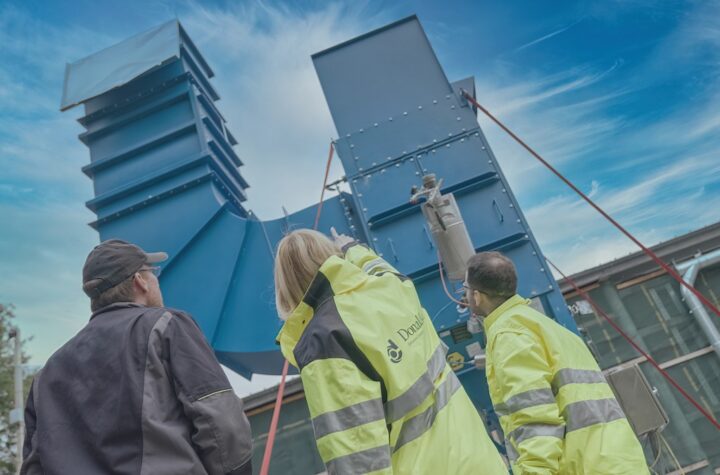The automotive industry is evolving rapidly, with electric and autonomous vehicles dominating the conversation as the near future of mobility. While automakers try to keep pace with changing regulations for fuel economy and emissions, as well as consumer expectations, suppliers are equally challenged to stay ahead of the curve.
Constellium, a supplier of aluminum extrusion-based crash management systems and structural components, as well as other value-added aluminum products for the automotive, aerospace and packaging markets, is focused on anticipating customer needs and developing advanced solutions to meet them. A Tier 1 supplier for dozens of vehicle models including the BMW X3, Ford F-150, MINI Countryman and Peugeot 3008, Constellium is developing new aluminum alloys and new products while expanding its footprint to increase capacity closer to its customers. “As automakers continue to make vehicles lighter, and electric vehicles become more prevalent in the market, Constellium is uniquely positioned to offer superior materials, but also the design, simulation, testing, prototyping and production expertise to bring advanced solutions to market,” says Paul Warton, President of Constellium’s Automotive Structures and Industry Business Unit.
A material difference
The new Constellium HSA6TM family of high-strength alloys is one example of how the company is driving change. “With Constellium HSA6TM, we are able to offer automakers a family of the highest strength 6000-series aluminum alloys available on the market for extruded components,” says Martin Jarrett, Operational Excellence and Technology Director. “Offering Ultimate Tensile Strength (UTS) of more than 400MPa, the new alloys provide enhanced recyclability, machinability and corrosion resistance, which are advantages over competing 7000-series alloys of similar strength”. The new alloys were designed for aluminum extrusion-based products such as crash management systems, body-inwhite structural components and battery enclosures.
They allow designers to optimize extrusion shapes and reduce wall thicknesses to fit tighter packaging spaces and achieve a weight savings of 15-30% when compared to conventional aluminum alloys. In other scenarios Constellium HSA6TM is able to provide 15-30% additional strength to reduce intrusion in the event of a crash. This is important to protect vehicle occupants, but also to preserve the integrity of the vehicle and reduce potential repair costs. Aluminum is the ideal material for absorbing energy, so automakers choose it for components that protect batteries, cooling systems and other critical modules. Constellium HSA6TM was honored at the recent Altair Enlighten Awards, an annual celebration of vehicle weight savings at the CAR Management Briefing Seminars in Traverse City, Michigan, taking Runner Up in the Enabling Technology Category. Constellium’s proprietary alloys are produced at its extrusion plants in Europe and at Astrex, a new joint venture with Can Art in Ontario, Canada.
Aluminum demand is growing
The time seems just right for a new aluminum targeted for automotive components. Ducker Worldwide has just released a new study on the aluminum content in North American light vehicles through 2028. The study asserts that while most vehicles in the future will be multi-material, aluminum – already the fastestgrowing automotive material – will experience an unprecedented rate of growth over the next decade.
Ducker found that aluminum extrusion content in particular is increasing dramatically. Aluminum extrusions for crash management systems are expected to rise 65%, while demand for extruded body-in-white components will grow 100%. Not only is Constellium providing the material, it is also designing the extrusions and components, as well as simulating, prototyping, testing and producing them.
Expanding operations to meet demand
In 2016, Constellium opened its University Technology Center (UTC) at Brunel University London, an institution renowned for its expertise in liquid metal engineering. The UTC is home to dedicated casting and extrusion equipment that allows Constellium to prototype alloys and extrusions at production scale. These resources mean that alloys can be developed in smaller batches and Constellium no longer has to wait for an opening in production activity at one of its extrusion plants. OEMs benefit from alloy development times that are reduced by 50% and sometimes even more. “Our UTC team brings together vast experience in terms of metallurgy, engineering and production with equipment that we’ve specified,” said Martin Jarrett, who heads the center for Constellium, supervising several engineers and Brunel post-graduate fellows. “We’re in the process of expanding the center to prototype and test automotive structures and crash management systems on site, which will help our customers bring products to market even faster.” The UTC works closely with design and development teams in Germany and the U.S. that are partnering with automakers on global programs to be produced at Constellium plants across Europe, North America and China. The company has recently expanded its footprint to produce components for the automotive industry. Earlier this year, a new plant opened in White, Georgia, bringing the supplier closer to automotive assembly plants in the Southeast U.S. The 135,000 sq. ft. facility may be expanded in the future to meet additional demand. Next year, Constellium will open its first plant in Mexico, choosing San Luis Potosí for its central location and proximity to several automakers.
A bright future
Aluminum continues to be a material of choice for automakers to reduce vehicle mass and attain improved fuel economy, lower emissions and – in the case of electric vehicles – increased range. By saving weight throughout the vehicle, automakers are able to integrate additional comfort and infotainment features, which is a win for consumers. As the auto industry drives toward a new age of mobility it is clear that aluminum and Constellium will go the distance.














































 The tubes and connectors transporting fluids and gases under the hood Â
The tubes and connectors transporting fluids and gases under the hood   Smart Flexible Tubular Module – more than a steel pipe Â
Smart Flexible Tubular Module – more than a steel pipe   Multiple choices for connecting semi-autonomous and autonomous vehicles
Multiple choices for connecting semi-autonomous and autonomous vehicles The glue that binds automotive design innovation
The glue that binds automotive design innovation Shining a light on in-vehicle illumination trends Â
Shining a light on in-vehicle illumination trends   Unstoppable groundswell DRIVING CHANGE Â
Unstoppable groundswell DRIVING CHANGE Â 


